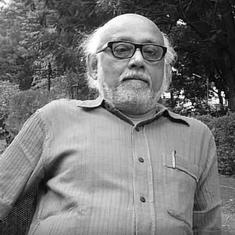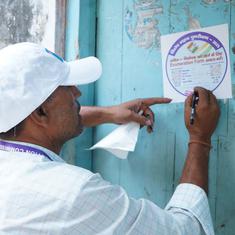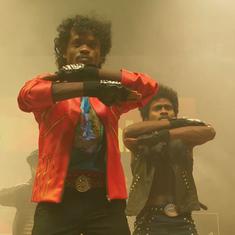The night before had been a sleepless one for Madhu. She had tossed and turned for hours, but when sleep finally came, around dawn, it was a deep one. The alarm kept ringing and her mother had to shake her awake.
“Beta, you will be late,” Uma – never one to raise her voice – said gently.
It always annoyed Madhu when her mother addressed her as “beta”. For her father, she was always “beti”, daughter. She knew it was a common practice in many families to call all children “beta”, regardless of gender, but still, it sometimes gnawed at her. She was their only child. Was her mother disappointed that she did not produce a male heir, someone to take care of them in old age, someone to “carry forward the family name”? But the feeling never lasted longer than a second. Madhu knew that she was overreacting. They loved her unconditionally. She often had to remind herself that she was, in fact, lucky in her parents. Had she been born in any other family in her community, she would have been married by now and probably a mother, too.
She looked at the clock and cursed. Today, of all days, she was going to be late for college. Madhu intended to be outside the iron gates before they were flung open, to be among the first to see the results posted on the board.
Pass or fail, first or third class, she did not want to hear it secondhand from anyone. Why was this so important to her? Madhu didn’t exactly know, but it was.
She brushed her teeth quickly, gargled a little less than usual and did two quick strokes with the silver tongue-scraper. Then she showered and got dressed in her lucky outfit, washed, pressed and kept ready for this day. The breakfast, a slice of buttered toast with milky masala chai was taken on the run, a feat that annoyed as well as impressed her mother. Uma had cooked up a storm for breakfast – parathas stuffed with aloo, gobi, and chutneys of three different varieties – but Madhu did not touch any of it.
“Come on, Maa, hurry up.”
The mother refused to be hurried. Some things could not be rushed, and risking the displeasure of the line-up of gods in front of her was one of them. She rang the prayer bell vigorously as she chanted. The incense stick holder was overloaded today and the smoke, pleasant as it was, a bit overpowering.
Mother and daughter were in the family prayer room of the Gupta home, a little, windowless room next to the kitchen with a spacious cupboard that was over-crowded with small brass and marble figurines of gods and goddesses – Krishna, Ganesh, Lakshmi, Hanuman, Durga and the Shiva-linga – to whom the family turned for help on different occasions. While Lakshmi, goddess of wealth, the consort of Vishnu, was her husband’s favourite, Uma herself was partial to Ganesh. It was him she addressed as she prayed for her daughter’s success in the college results. Madhu graduating would be a first for the women of the family.
Uma put a tika on her daughter’s forehead, holding the tray of lit diyas with her other hand. Both mother and daughter knew the tika would be rubbed off once Madhu was on the streets.
“Hurry up, Maa,” said Madhu again and Uma frowned. Madhu whispered a sorry, for she loved her mother too much to disrespect her gods. Besides, she was on the fence herself when it came to religion. She certainly did not want to displease any god and invite misfortune.
Not far from where Madhu lay tossing and turning a few hours ago, Seema also awoke at her home in the walled city of Old Delhi. Family lore had it that their ancestors from her father’s side were part of the entourage that moved with Mughal Emperor Shah Jahan when he shifted his capital in 1628 from an overcrowded Agra to a more spacious Delhi.
At that time the head of the family had a high rank in the imperial court and the family’s new home in Delhi, a haveli, had a formal garden – with a fountain! – where deer roamed and peacocks danced. This, at least, was the family legend. The Yamuna lay on the other side of the wall of their compound and, it was said, the family’s felucca was docked a few steps down the steps. They used it for sailing and in good weather would picnic somewhere on the riverbank and a retinue of servants would be sent ahead to make preparations.
That was then. The family fortune declined over the centuries and by the time the last emperor was exiled to Rangoon, their glory days were long over. They could no longer afford the haveli. It was sold to the British army for a pittance and later demolished to make way for a housing estate for officers and their families.
Now Seema’s family occupied a two-room flat above a row of small shops and dhabas in a lane close to the grand mosque in the walled city. To reach the flat one had to climb an unlit staircase that was seriously in need of repair. Above the flat was a terrace that was exclusive to it. On hot summer days and nights, it was a godsend to the family, air conditioning being a luxury beyond their reach. They had a desert cooler, but given the water supply in their locality – an hour in the morning and even less in the evening – that too was a luxury.
On cold winter nights, the staircase was used by street people as their sleeping quarters and the family did not have the heart to turn them away. Seema and her family were careful, going up or down, not to step on the sleeping forms. On particularly bitter nights Jabeen sent them hot chai in kulhars.
Jabeen, Seema’s mother, came from a line of zamindars from Azamgarh. The family had converted to Islam in the seventeenth century. It was the time when Vikramjit, the Rajput ruler, changed his name to Azam Khan and gave the district his name. By the time Jabeen was born, the family had lost most of their land, but there was still enough to live with some dignity, if not comfort. Jabeen’s parents grew maize and owned a mango orchard. They had seen better times, but the rundown family house in Azamgarh was spacious and comfortable.
Jabeen’s was an arranged marriage and she had not seen her husband before the nikaah. The baraat, a modest one, had come by train from Delhi. The two were distant cousins. If she was disappointed on first setting eyes on the somewhat cramped living quarters in Delhi, she had the grace not to show it. Her husband, Zafar Chaudhry, was a loving man and a good provider, and though they had their struggles, it was a happy marriage.

Excerpted with permission form Across The River, Bhaichand Patel, Speaking Tiger Books.










